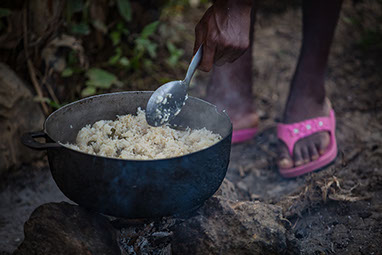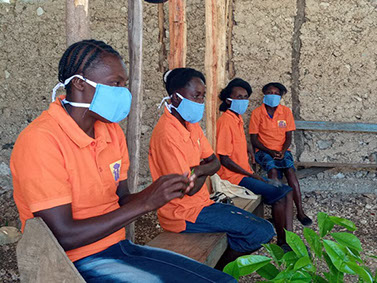Fonkoze’s Strategic Response
Well before Haiti had its first confirmed case of COVID-19, leaders of Fonkoze created the country’s first Creole-language training on the disease while developing a strategic response plan to help the hundreds of thousands of people it serves across the country protect themselves and prevent the spread of the disease.
In a country where the medical system is already fragile and accessibility to basic health services (and clean water) for its poorest citizens is severely lacking, a COVID-19 outbreak could devastate Haiti. The country’s lack of infrastructure (e.g., paved roads) makes it difficult for health officials to reach those infected and vice versa.
With branches located in virtually every region in Haiti, Fonkoze leveraged its large network to administer sanitation, water purification and other training to its 900+ staff and nearly 1,400 trained Community Health Entrepreneurs (CHEs) across the country. Read the news article.
With more than 83% of the microenterprises Fonkoze serves located in crowded marketplaces, Fonkoze also created a public service announcement in Haitian Creole to alert its clients as to ways they can protect themselves in the marketplace. In addition, Fonkoze’s Education department developed an illustrated storybook to further educate clients about COVID-19.
Protecting Vulnerable Households
Fonkoze leveraged its CHE network as well as its Chemen Lavi Miyò (CLM) team to support the most vulnerable households it serves. This involved continuing home visits to these households. CHEs, who had been conducting mass malnutrition screening campaigns with support from USAID, were forced to halt the campaigns due to restrictions on gathering sizes. Instead, they traveled door-to-door screening children and pregnant/lactating women for malnutrition. For identified cases, they continued household visits to provide support.
In addition to those affected by malnutrition, some of the most vulnerable families Fonkoze serves are members of its CLM Program, a program designed to lift families out of ultra poverty. To support CLM families through crisis—and to facilitate their social distancing—Fonkoze provided them with two cash transfers of HTG2500 (roughly $23 at the time). Initially, Fonkoze was concerned that a complete COVID-19 lockdown would keep CLM Case Managers (social workers) from providing critical support to CLM families through weekly home visits. Thanks to the support and flexibility of its donors, Fonkoze was able to provide inexpensive cell phones and solar chargers to all CLM families. In the end, Fonkoze did not need to halt home visits, but the cell phones have proven to be a valuable communication and support tool for the program. The organization also established an economic recovery fund to provide grants to CLM families whose newly established livelihood activities failed as a result of the pandemic.
Training, Protective Items and More to Thousands
Thanks to the ongoing support of its donors, Fonkoze has equipped thousands of its staff and client leaders across the country with the resources and tools needed to stay healthy:
- Distribution of soaps, masks
- Distribution of handwashing stations
- Distribution of solar chargers
- Distribution of hygiene kits
- Dissemination of training to thousands
Ensuring Food Security

In addition to helping its clients and their communities protect their health during this pandemic, Fonkoze’s strategic response to COVID-19 in Haiti also involved taking measures to ensure the most vulnerable populations throughout the country do not become more food insecure in the days and weeks to come.
Learn more about Fonkoze’s work with the ultra-poor.
Economic Recovery
Since 1994, Fonkoze has empowered disenfranchised and poor Haitians to lift themselves out of poverty and to deal with crises, including hurricanes, earthquakes and political upheaval and pandemics. As such, Fonkoze Financial Services (SFF) employed the following strategies to support clients through the end of 2020:
- When clients sought to renew their loans, they were not negatively evaluated for late payments on previous loan(s).
- Financial literacy coaching was provided to advanced clients (Business Development clients) on coping mechanisms for their businesses during COVID. This coaching leveraged the tools we use to support our microloan clients in their Solidarity Centers.
- SFF offered to reschedule loans for clients diagnosed with COVID-19, if requested.
- Clients were educated on the details of moratorium options, as per Central Bank. Once it was properly understood, if the request was made, it was granted. In total, SFF rescheduled 72 loans for HTG 29 million of which 8 million is outstanding for 30 clients.
- For microcredit clients who took out loans in the days before the nationwide lockdown, SFF allowed them to return the loan without a penalty for a later disbursement date.







